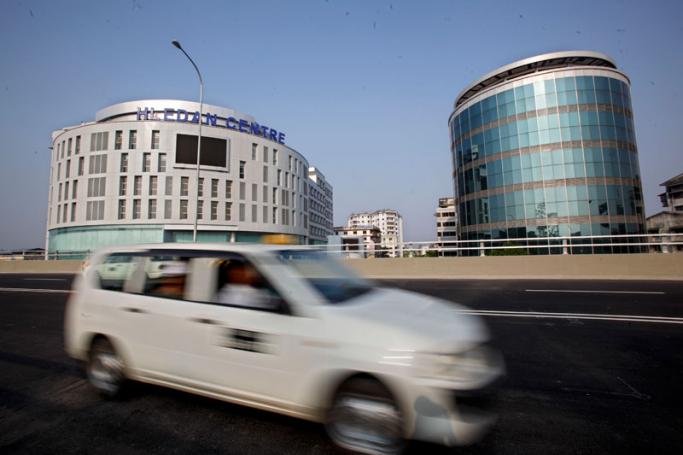“I will vote for democracy; for the NLD”, this comment marked a break from my taxi driver's hitherto reservation to talk about Myanmar's impending election.
For decades, this man had lived under a brutal and pervasive military junta and it took some time before he opened up to me. I knew about his ambition to move to the USA, his family and favourite brand of cigarettes before he would share his thoughts on the current situation in Myanmar.
The NLD are the clear favourite to win on 8 November, some suggest they may even do so by a landslide. I wanted to understand why.
The driver stuck his hand into a pile of disorganised papers strewn across his dashboard and pulled out a red leaflet. It was adorned with the faces of Aung San Suu Kyi, leader of the National League for Democracy (NLD), and Aung San, a public hero who is credited with liberating Myanmar from colonial rule. Only moments after handing it to me, he snatched it back: "because she is the daughter of Aung San".
I was disappointed. I was hoping to hear about how the NLD would confront corruption, improve higher education or tackle the country's dire human rights record. Alas, Myanmar's election is not being fought over specific policy. There are no talks about housing bubbles, tax credits or quantitative easing. For Myanmar, this election is about choosing between the familiar or risking it all and exploring the uncharted world of democracy.
I pressed further and asked what changes Suu Kyi and the NLD would bring: "she is friends with Barack Obama. If the NLD win, the world will talk to Myanmar."
Myanmar has lived most of its recent history in isolation and for many years it endured the hardships associated with Western economic sanctions. These were, however, eased in 2012 when the government committed to democratic reform.
The driver said that he thought Myanmar's international reputation would improve if the NLD won. This was necessary, he explained. Myanmar is still considered one of the world's poorest countries and there is an urgent need to increase trade and receive more international aid.
One of the issues presently marring Myanmar's international reputation is the deplorable discrimination against the Rohingya Muslim population in the state of Rakhine. Despite being able to vote in the 2012 by-elections, many Rohingya have now been told that they are not citizens and, therefore, unable to vote in the 2015 election. Many suffer routine violence, discrimination and lack equal employment prospects. Thousands have chosen to flee their homes. Last month Amnesty International released a statement: “[the Rohingya face a] harrowing picture of mob attacks, deaths and disappearances”.
I asked him for his thoughts: "they are Bengali, they are not from Myanmar. They come in from Bangladesh because they have no jobs there but we are poor, there are now jobs here. They should go back".
I put to him the argument that many were born in Myanmar, children or grandchildren of migrant workers brought over by the British. “No, they are lying”, he replied. I asked if he meant all of them. His response was resolute: “yes, all of them”.
Few seem willing to challenge this narrative. In the past, Aung San Suu Kyi has attempted to defend minority groups but as religion and state have become increasingly intertwined, she has been conscious of picking her words carefully.
On 5 November, Suu Kyi was asked about allegations that the violence against the Rohingya in 2012 was state-sponsored and, therefore, genocide. Her response was as calculated: “it is very important that we should not exaggerate the problems”.
The more radical sects of society still accuse Suu Kyi of being a 'Muslim lover' who will not stick up for traditional Buddhist Burmese culture. This is an image the incumbent Union Solidarity and Development Party (USDP) have been keen to capitalise on.
I asked the driver to explain the causes behind the rise of Islamaphobia. He explained that people are afraid of losing their culture and that the Islamic population stood out; they dress differently, eat different foods and live in different parts of town.
He wasn't able to tell me why the presence of Islamic culture mattered or how the growing tensions could be resolved. It was clear, however, that he was uncomfortable with the violence being carried out against them
Behind the more extreme wing of the anti-Islamic sentiment in Myanmar is an organisation of radical Buddhist monks called Ma Ba Tha. Its leader, Ashin Wirathu, has openly called Muslims “snakes" and "dogs”.
Before I could even finish Wirathu's name, the driver interrupts: “f**k Ma Ba Tha”. This was an entirely different person to the man I tried to engage with when I first got into the taxi.
“No violence”, he told me as he pulled up to my destination. “All religions can live together. They all have good and bad [people]”.
His last statement told me that this man's mind was torn. He wanted tensions between the two communities to end but at the same time was unwilling to compromise that there was a place for Islam in Myanmar. Violence seems to be his line in the sand but it left me wondering, what it will take before he, and those like him, actually speak up?
Conversation with a taxi driver: a personal take on Myanmar’s election
07 November 2015
Conversation with a taxi driver: a personal take on Myanmar’s election












